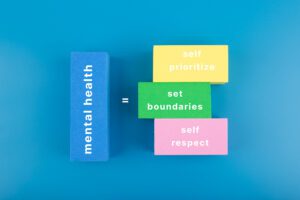The Power of Boundaries: Your Key to Managing Stress and Finding Balance
“Our boundaries define our personal space – and we need to be sovereign there in order to be able to step into our full power and potential.” Jessica Moore
The Power of Boundaries
In the fast-paced, interconnected world we live in today, maintaining a healthy work-life balance, nurturing relationships, and safeguarding your well-being can often feel like a daunting challenge. This is where boundaries come into play. Boundaries are an essential tool for maintaining your physical and emotional health, reducing stress, and fostering positive relationships.
What Are Boundaries?
Boundaries, in a psychological and interpersonal context, refer to the limits and guidelines that we establish to protect our physical and emotional well-being. They are the invisible lines that define the extent to which we allow others to interact with us and impact our lives. Boundaries are not about building walls but rather creating healthy spaces that nurture self-care, respect, and personal growth.
Types of Boundaries
- Physical Boundaries: These boundaries define your personal space and physical comfort. They involve setting limits on how close others can physically come to you or how you allow them to touch you.
- Emotional Boundaries: Emotional boundaries are about safeguarding your feelings, thoughts, and emotions. They involve communicating your emotions clearly, knowing when to say “no” to emotional demands, and respecting others’ emotional boundaries.
- Time Boundaries: Time boundaries determine how you allocate your time and energy. Setting limits on the amount of time you spend on work, social commitments, and personal pursuits can help you maintain a balanced life.
- Material Boundaries: These boundaries pertain to your possessions and resources. It’s about being clear on what you’re comfortable sharing or lending and under what conditions.
- Social Boundaries: Social boundaries define the level of intimacy and connection you share with others. This includes the extent of disclosure about your personal life, as well as managing the frequency and nature of social interactions.
Importance of Managing Boundaries for Stress Reduction
Effective boundary management is a powerful tool for managing stress:
- Preventing Burnout: Boundaries help you avoid over committing yourself, reducing the risk of burnout and chronic stress.
- Enhancing Self-Care: They enable you to allocate time and energy for self-care activities, which are essential for mental and physical well-being.
- Healthy Relationships: Setting and respecting boundaries fosters healthier, more respectful relationships, reducing interpersonal conflicts and emotional turmoil.
- Boosting Productivity: By defining your work and personal life boundaries, you can increase your focus and productivity during work hours and enjoy quality leisure time when off the clock.
How to Create and Implement Boundaries
- Self-Awareness: Begin by understanding your own needs, values, and limits. Self-reflection is key to establishing effective boundaries.
- Communicate Clearly: Express your boundaries to others in a clear and respectful manner. Use “I” statements to convey your feelings and needs without blame or judgment.
- Learn to Say “No”: Saying no when necessary is a fundamental aspect of boundary-setting. It’s okay to decline requests or invitations that don’t align with your needs or values.
- Prioritize Self-Care: Make self-care a non-negotiable part of your routine. Allocate time for activities that rejuvenate you and stick to those boundaries.
- Enforce Boundaries: Be consistent in enforcing your boundaries. When someone crosses a boundary, communicate your discomfort, and assertively reinforce the limit.
Defining Boundaries
- Specificity: Your boundaries should be clear and specific. Avoid vague or ambiguous statements, as they can lead to misunderstandings.
- Flexibility: While boundaries are important, they should also allow for some flexibility based on situational needs and circumstances.
- Regular Review: Periodically review and adjust your boundaries as your needs and circumstances evolve. What was suitable in one phase of life may need modification in another.
Ignored Boundaries:
Dealing with someone who consistently ignores your boundaries can be challenging, but it’s crucial to assert yourself:
- Clearly Reiterate Your Boundaries: Politely but firmly remind the person of your established boundaries, ensuring they understand your limits.
- Set Consequences: Clearly communicate the consequences of continued boundary violations, so they are aware of the potential outcomes of their actions.
- Limit Interaction: If the person continues to disregard your boundaries, consider limiting your interaction with them or creating physical distance to protect your well-being.
- Seek Support: Reach out to trusted friends, family, or a therapist for advice and emotional support in dealing with the situation, as their guidance can be invaluable in maintaining your boundaries.
Repercussions of Neglecting Boundaries
Failing to establish and maintain healthy boundaries can lead to several negative consequences:
- Stress and Burnout: Without boundaries, you risk spreading yourself too thin, which can result in chronic stress and burnout.
- Resentment: Unresolved boundary issues can breed resentment towards others, damaging relationships, and your overall well-being.
- Decreased Self-Esteem: Neglecting your boundaries can erode your self-esteem and sense of self-worth as you consistently prioritize others over yourself.
- Unhealthy Relationships: Poorly defined boundaries can lead to codependent or toxic relationships where personal needs are consistently overlooked.
Summary
In conclusion, boundaries are not barriers to connection but rather the framework that allows for healthier, more meaningful connections. By setting clear boundaries, you empower yourself to manage stress, protect your well-being, and cultivate more fulfilling relationships. Remember that boundaries are a continuous journey of self-discovery and communication, and they are essential for living a balanced and harmonious life in our complex world.
Holistic Coaching
Holistic coaching offers a comprehensive approach to managing stress and setting clear boundaries by addressing various aspects of an individual’s life, including physical, emotional, and mental well-being. It helps clients identify the root causes of their stress and explore strategies to mitigate it effectively. Holistic coaches guide individuals in understanding their personal boundaries and empower them to set clear limits, ensuring that they prioritize self-care, maintain a balanced lifestyle, and reduce the risk of overwhelming stress. This approach fosters long-term well-being and resilience, enabling clients to navigate life’s challenges with greater ease and emotional balance.
If you would like more information about how to set healthy boundaries and effectively manage stress, please check out our services or contact us.

